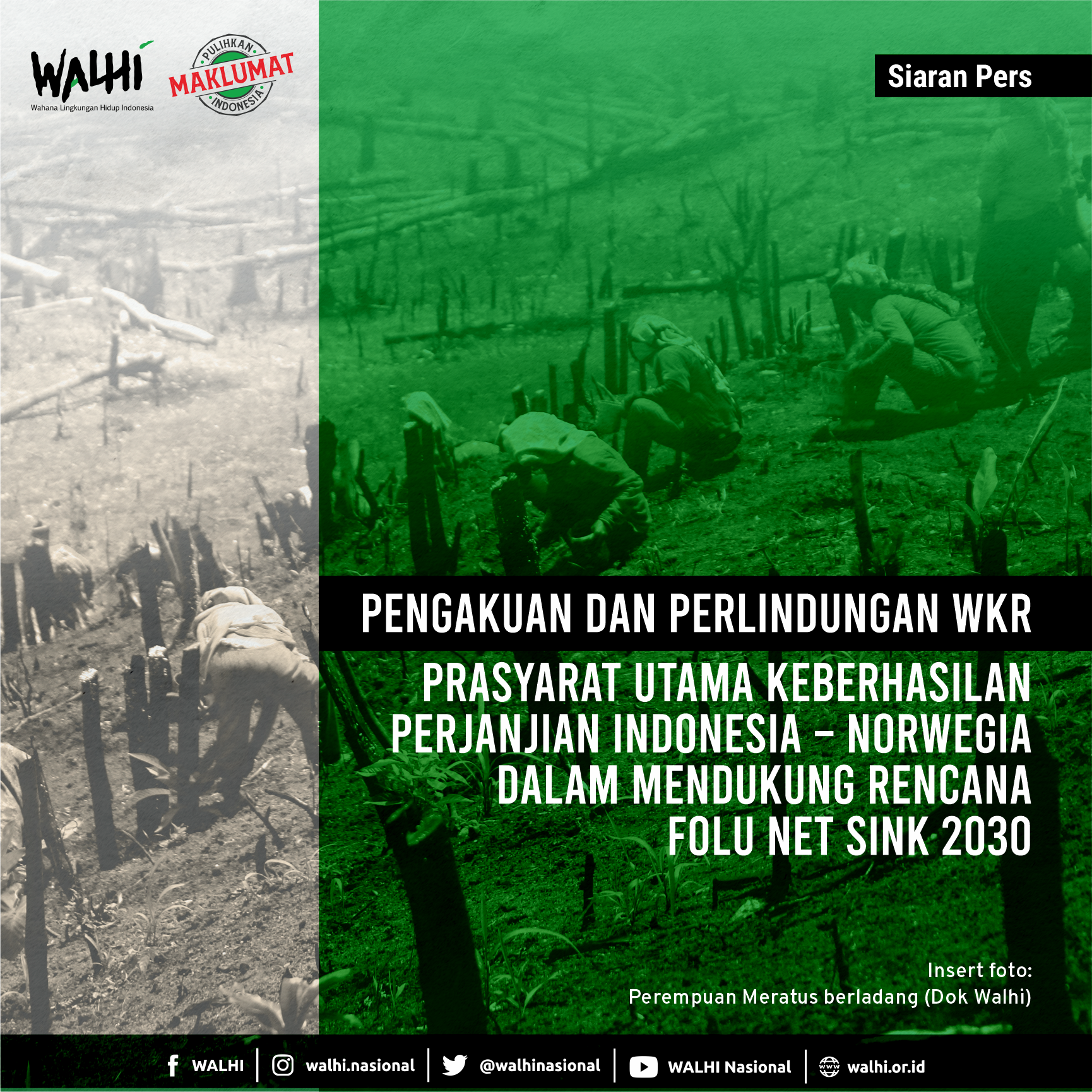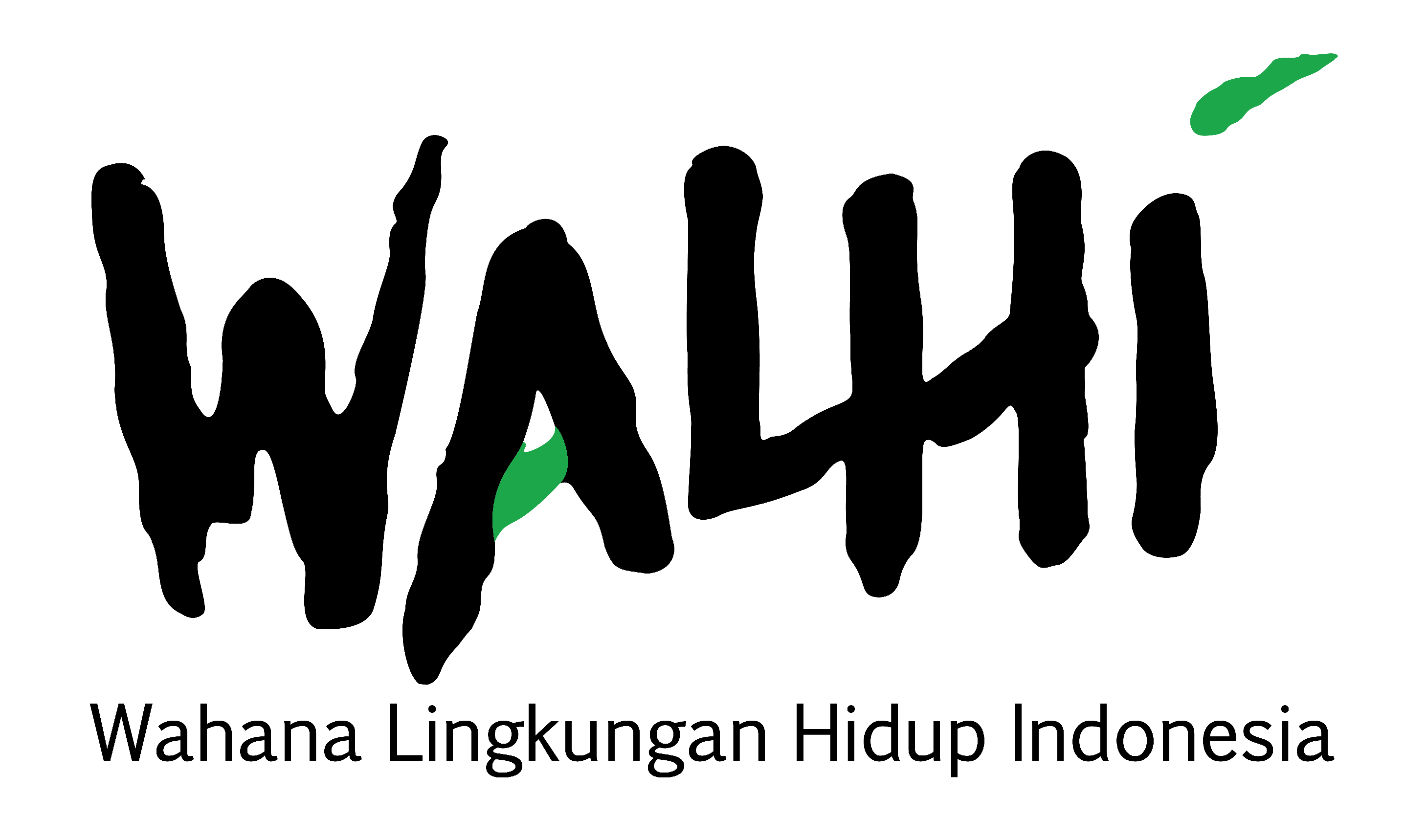
Bilingual
Siaran Pers
Wahana Lingkungan Hidup Indonesia (WALHI)
Pengakuan dan Perlindungan WKR prasyarat utama keberhasilan perjanjian Indonesia – Norwegia dalam mendukung Rencana FOLU Net Sink 2030
Jakarta - (13/09). Setelah 40 tahun mengalami eksploitasi masif di sektor kehutanan, walaupun masih banyak catatan namun, dalam 7 tahun terakhir upaya koreksi telah mulai dilakukan oleh pemerintah Indonesia, dengan melanjutkan moratorium perizinan di hutan primer, review perizinan dan pengalihan distribusi akses hutan dan lahan kepada rakyat melalui Program Perhutanan Sosial yang saat ini baru mencapai 3 juta hektar dari target 12.7 Juta Hektar sedangkan Program TORA dari redistribusi lahan masih sangat minim dan jauh dari target.
Dilanjutkannya kerjasama Pemerintah Indonesia-Norwegia melalui MoU antara Kementerian Lingkungan Hidup dan Kehutanan (KLHK) Indonesia dengan Menteri Iklim dan Lingkungan Hidup Norwegia pada Senin(12/09), patut diapresiasi dan kami sambut dengan baik. Ujar Zenzi Suhadi Direktur Eksekutif Nasional Walhi.
Kerjasama antara Indonesia - Norwegia berdasarkan rilis resmi yang dipublikasi oleh KLHK (12/09) adalah untuk mendukung Rencana Operasional FOLU Net Sink 2030, sebuah rencana ambisius untuk mencapai net sink di sektor kehutanan dan penggunaan lahan lainnya dengan mengurangi emisi dari deforestasi, degradasi hutan dan lahan gambut yang kaya karbon serta menyerap lebih banyak karbon melalui restorasi hutan, lahan gambut dan bakau, sehingga mampu dan menjadikan Indonesia sebagai Negara yang maju memimpin penurunan emisi dari hutan dan penggunaan lahan, menurut Walhi kerjasama Indonesia - Norwegia ini akan berjalan efektif bila fokus menyasar 5 hal :
- Penurunan deforestasi, dengan mencabut izin-izin konsesi perusahaan di kawasan hutan serta melakukan moratorium izin perkebunan sawit dan tambang.
- Percepatan Pengakuan dan Perlindungan Wilayah Kelola Rakyat (WKR) baik yang berada di dalam kawasan hutan maupun di luar kawasan hutan, serta di pesisir dan pulau-pulau kecil.
- Mendukung ekonomi rakyat yang tumbuh dengan menjaga atau memulihkan hutan dan lahan serta fungsi lingkungan.
- Mengembalikan daya tampung alam dan menghentikan kejahatan kehutanan dan lingkungan dengan melakukan penegakan hukum.
- Lahirnya kebijakan baru berupa Undang-Undang tentang Keadilan Iklim dan dicabutnya aturan dan kebijakan yang menjadi sumber perusakan lingkungan hidup di Indonesia.
Dorongan Walhi ini didasari oleh laporan IGRK (Inventarisasi Gas Rumah Kaca) 2017-2019, di mana sektor kehutanan dan tata guna lahan atau forest and other land use (FOLU) masih menjadi penyumbang emisi gas rumah kaca nasional tertinggi secara berturut-turut. Pada tahun 2017 sektor kehutanan dan tata guna lahan menyumbang emisi nasional sebesar 36 persen, tahun 2018 sebesar 44 persen dan puncaknya pada tahun 2019 sebesar 50 persen. Emisi sektor FOLU pada tahun tersebut setara dengan 924.853 Giga CO2eq.
Sumber penyumbang emisi tersebut salah satunya deforestasi yang masih terjadi di kawasan hutan akibat masih didominasinya penguasaan hutan dan lahan oleh perusahaan. Data Walhi dalam Tinjauan Lingkungan Hidup (TLH) 2022 menyebutkan lebih dari 33 juta hektar kawasan hutan di indonesia masih dibebani izin, seluas 4,5 juta hektar di antaranya dikuasai oleh konsesi pertambangan, juga diperparah dengan rencana-rencana proyek strategis nasional, seperti food estate. Lebih dari 3,2 juta hektar kawasan hutan lainnya diperuntukkan bagi proyek food estate di Kalimantan Tengah, Sumatera Utara dan Papua.
Perusakan pesisir laut, khususnya mangrove, oleh proyek-proyek nasional—solusi palsu—terkait perubahan iklim (maladaptasi dan malmitigasi) juga berkontribusi dalam menghasilkan emisi gas rumah kaca, seperti pembangunan tanggul laut, pembangunan tambak udang secara masif dengan alasan pemulihan ekonomi nasional, pariwisata secara besar besaran. Proyek-proyek ini justru mempercepat laju penghancuran terhadap upaya dan inisiatif rakyat serta nilai-nilai dan pengetahuan lokal dalam melakukan adaptasi dan mitigasi serta perlindungan terhadap dampak krisis Iklim yang semakin nyata terjadi di indonesia.
“Dengan mempercepat perluasan terhadap Pengakuan dan Perlindungan WKR adalah solusi berkelanjutan mengatasi krisis iklim. Ini adalah prasyarat penting yang harus dilakukan oleh Pemerintah Indonesia untuk mencapai FOLU Net Sink. Sebab WKR bukan hanya dapat memulihkan ekonomi rakyat secara langsung, tetapi memiliki dimensi pemulihan ekosistem (baca; reforestasi hutan dan lahan) dari kondisi krisis sosial ekologis yang telah terjadi puluhan tahun di Indonesia.” tutup Zenzi.
Catatan redaksi:
FoLU - forest and other land uses (pemanfaatan hutan dan penggunaan lahan) Net Sink 2030. Dalam dokumen penurunan emisi atau nationally determined contribution (NDC), FoLU menjadi satu dari lima sektor program mitigasi krisis iklim. Jadi FOLU net sink atau lengkapnya FoLU carbon net sink? Carbon net sink adalah penyerapan karbon bersih yang merujuk pada jumlah penyerapan emisi karbon yang jauh lebih banyak dari yang dilepaskannya. Maka FoLU net sink adalah keadaan ketika sektor lahan dan hutan menyerap lebih banyak karbon daripada yang dilepaskannya.
Narahubung:
Hadi Jatmiko, Kepala Kampanye Eksekutif Nasional WALHI ([email protected])
----- -----
Pers Release
Wahana Lingkungan Hidup Indonesia (WALHI)
Recognition and protection of WKR (Community-based Area Management) is the key prerequisite for the success of Indonesia-Norway agreement in supporting the 2030 FOLU Net Sink Plan
Jakarta - (13/09). After 40 years of experiencing massive exploitation in the forestry sector, in the last 7 years the Indonesian government has begun to make correction efforts by continuing the moratorium on permits in primary forests, reviewing permits and diverting the distribution of forest and land access to the people through. They are implemented through Social Forestry Program. The program has only reached 3 million hectares from the target of 12.7 million hectares. In the other hand, TORA Program for land redistribution is still very minimal and far from the target.
“The resumption of the cooperation between the Government of Indonesia and Norway through the MoU between the Indonesian Ministry of Environment and Forestry and the Norwegian Minister of Climate and Environment on Monday (12/09), should be appreciated and welcomed,” said Zenzi Suhadi as the National Executive Director of Walhi.
The cooperation between Indonesia – Norway according to an official release published by the Ministry of Environment and Forestry (12/09) is aimed to support the FOLU Net Sink 2030 Operational Plan. It is an ambitious plan to achieve net sinks in the forestry sector and other land uses by reducing emissions from deforestation, forest and peatlands degradation that are rich in carbon, and also absorbing more carbon through restoration of forests, peatlands, and mangroves. So that Indonesia has the ability to become a leading country in reducing emissions from forests and land use. According to Walhi, this Indonesia-Norwegian collaboration will be effective if it focuses on 5 things:
- Reducing deforestation, by revoking company concession permits in forest areas and implementing a moratorium on oil palm and mining plantation permits.
- Accelerating the recognition and protection of Community-based Area Management (WKR), both in forest areas and outside forest areas, as well as on the coast and small islands.
- Supporting the people's economy that grows by maintaining or restoring forest, land, and environmental functions.
- Restoring the natural capacity and stop forestry and environmental crimes by enforcing the law.
- Issuing new policy in the form of bill on Climate Justice and the revoking rules and policies that have become a source of environmental destruction in Indonesia.
This argument is based on the 2017-2019 IGRK (Greenhouse Gases Inventory) report, where the forest and other land use (FOLU) sector is still the highest contributor to national greenhouse gas emissions, respectively. In 2017, the forestry and land use sector contributed 36 percent to national emissions, while in 2018 it was 44 percent, and it peaked in 2019 at 50 percent. FOLU sector emissions in that year were equivalent to 924,853 Giga CO2eq.
One of the sources of emission contributors is deforestation that still occurs in forest areas due to the dominance of companies in forest and land control. Walhi’s data in the 2022 Environmental Review (TLH) mentions that more than 33 million hectares of forest areas in Indonesia are still covered by permits, which the 4.5 million hectares are controlled by mining concessions. These are also exacerbated by plans for national strategic projects, such as food estates. More than 3.2 million hectares of other forest areas are designated for food estate projects in Central Kalimantan, North Sumatra, and Papua.
The destruction of coastal seas, especially mangroves, by national projects - false solutions - related to climate change (maladaptation and malmitigation) also contributes to greenhouse gas emissions, such as the construction of sea dikes, the construction of massive shrimp ponds on the grounds of national economic recovery, and massive tourism. These projects actually accelerate the pace of destruction of people's efforts and initiatives as well as local values and knowledge in adapting, mitigating, and protecting against the impacts of the increasingly apparent climate crisis in Indonesia.
“Accelerating the expansion of the Recognition and Protection of Community-based Area Management (WKR) is a sustainable solution to the climate crisis. This is an important prerequisite that must be implemented by the Government of Indonesia to achieve FOLU Net Sink. Because WKR does not only directly restore the people's economy, but also has the dimension of ecosystem recovery (read; forest and land reforestation) from the socio-ecological crisis that has occurred in Indonesia for decades," stated Zenzi.
Editor's note:
FoLU - forest and other land uses Net Sink 2030. In the emission reduction document or nationally determined contribution (NDC), FoLU is one of the five sectors of the climate crisis mitigation program. FOLUnet sink or FoLUcarbon net sink is a net carbon sequestration which refers to the amount of carbon emission absorbed much more than it releases. Therefore, the FoLUnet sink is a situation when the land and forest sector absorbs more carbon than it releases.
Contact person:
Hadi Jatmiko, Head of Campaign Department of WALHI National Executive ([email protected])


